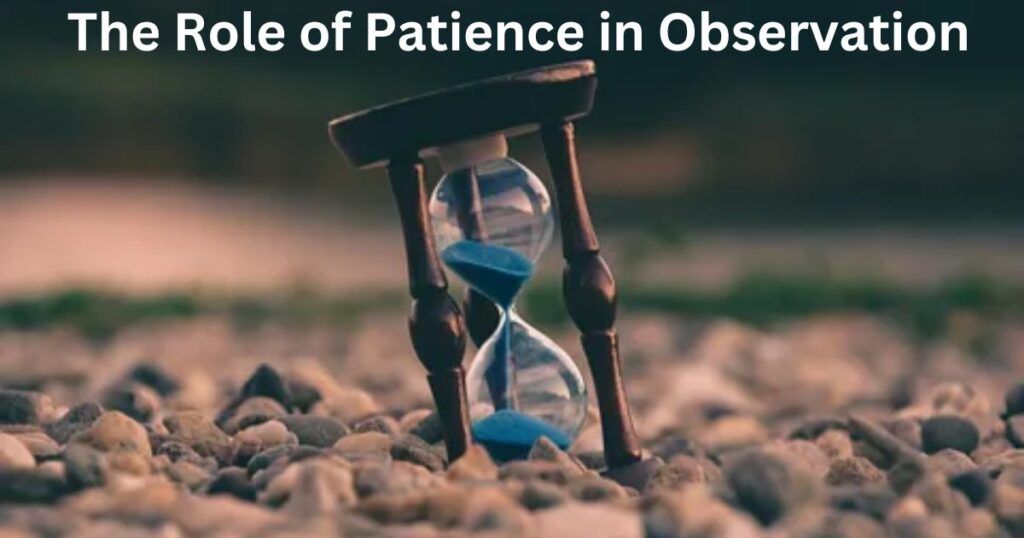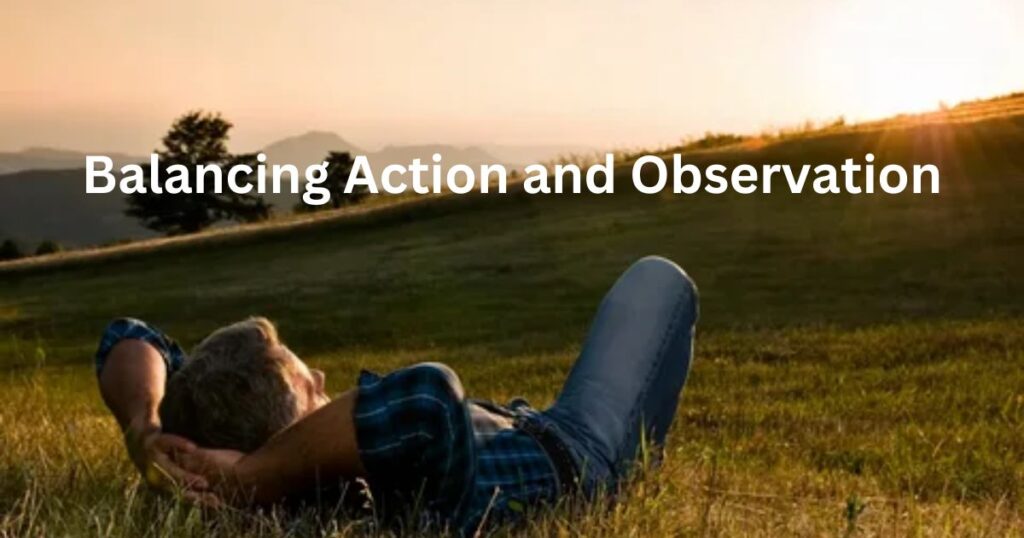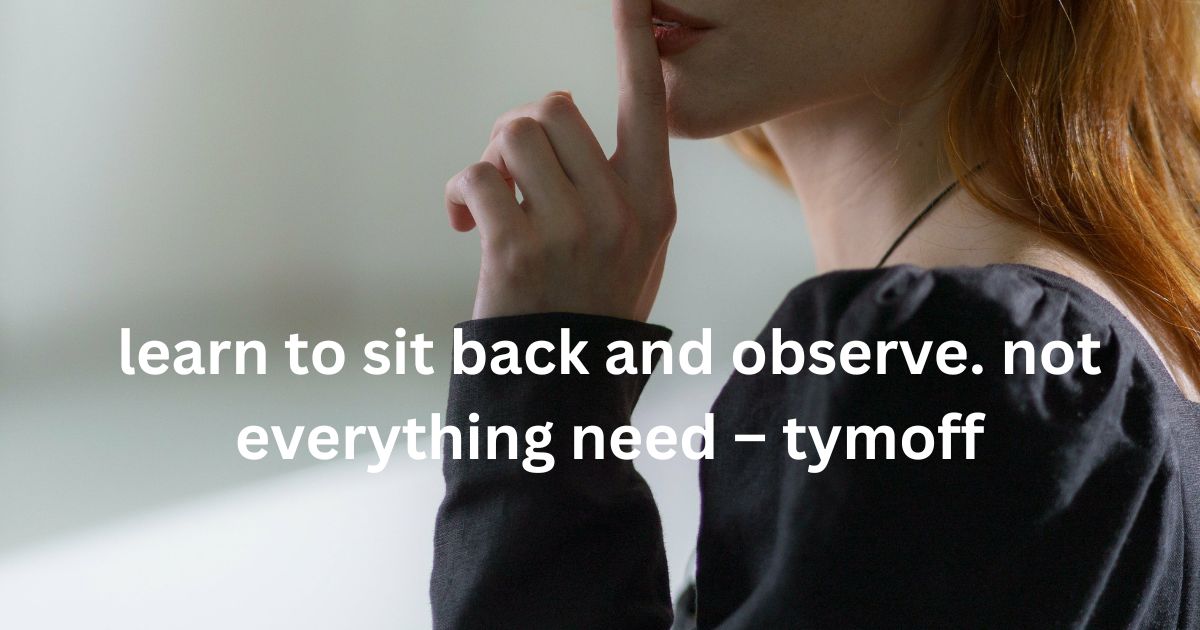In our fast-paced world, it’s easy to get caught up in the constant rush. But what if the secret to a more fulfilling life lies in slowing down and truly observing the world around us?
Tymoff, a thought-provoking writer, encourages us to embrace this philosophy. Through his insightful teachings, he reminds us that observation is a transformative practice – one that can unlock deeper insights, foster meaningful connections, and cultivate creativity.
This approach may seem counterintuitive in our always-on society, but Tymoff’s wisdom offers a refreshing perspective. By learning to sit back and observe, we open ourselves up to a world of possibility and personal growth.
Do You Ever Stop to Wonder?
In our fast-paced, modern world, it’s easy to get caught up in the whirlwind of daily life. We rush from one task to the next, constantly bombarded with notifications, emails, and demands on our attention.
But have you ever paused to ask yourself, “Is there a better way?” What if the secret to a more fulfilling life lies in the art of observation? Enter Tymoff, a thought-provoking writer who encourages us to embrace a different philosophy – one that celebrates the power of slowing down and truly seeing the world around us.
The Importance of Observation
At the heart of Tymoff’s teachings is a profound appreciation for the value of observation. Through his insightful writings, he reminds us that by taking the time to observe, we open ourselves up to deeper insights and a richer understanding of ourselves and the world we inhabit.
Understanding Tymoff’s Philosophy
Tymoff’s philosophy is rooted in the belief that observation is a transformative practice. It’s not just about passively watching the world go by; it’s about actively engaging with our surroundings, sharpening our senses, and cultivating a mindset of curiosity and open-mindedness.
Why Observation Matters
In our constantly connected, always-on society, it’s easy to feel disconnected from the present moment. Observation serves as an anchor, grounding us in the here and now. By truly seeing and experiencing the world around us, we gain a deeper appreciation for the beauty and complexity that often goes unnoticed in the rush of daily life.
The Art of Observation
Cultivating observation skills is an active process. It involves sharpening our senses, embracing curiosity, and truly engaging with our surroundings.
Cultivating Observation Skills
Learning to observe is an active process that requires practice and commitment. Tymoff advises taking practical steps like setting aside dedicated time for reflection, keeping a journal to record observations and insights, seeking out opportunities for stillness and solitude, and actively listening to others without judgment or preconceptions.
Practical Steps for Observation:
- Find a quiet spot and simply sit for a few minutes, observing your surroundings with all your senses.
- Keep a small notebook handy to jot down interesting observations or thoughts throughout the day.
- Practice mindful walking, paying attention to the sights, sounds, and sensations around you.
- When in conversation, resist the urge to formulate a response; instead, focus on truly listening to the other person.
The Role of Patience in Observation

Patience is crucial in observing. Overcoming distractions and biases takes conscious effort. Approaching each moment with a beginner’s mind is key.
Overcoming Challenges in Observing
Cultivating the art of observation takes time and patience. In our fast-paced world, distractions, biases, and preconceived notions can cloud our perception. Tymoff reminds us that observation requires conscious effort to overcome these challenges and approach each moment with a beginner’s mind.
Read Also: A True Relationship is Two Imperfect People Refusi – Tymoff
Harnessing Curiosity Through Observation
Observation fuels curiosity, leading to self-discovery. By truly seeing, we uncover aspects of ourselves waiting to be explored.
The Connection Between Observation and Self-Discovery
As we delve deeper into the practice of observation, we often uncover aspects of ourselves that were previously hidden or overlooked. Observation becomes a mirror, reflecting back our thoughts, emotions, and behaviors, allowing us to gain valuable insights into our own nature and psyche.
Applying Observation in Decision-Making
Observation enhances interpersonal relationships and creativity. It offers fresh perspectives, enabling more informed and innovative decision-making.
Observation in Interpersonal Relationships
One of the most profound applications of observation lies in our interpersonal relationships. By truly seeing and understanding the thoughts, feelings, and needs of those around us, we can foster deeper, more meaningful connections. Tymoff’s teachings encourage us to approach every interaction with an open and observant mindset, allowing us to communicate more effectively and build stronger bonds with others.
The Link Between Observation and Creativity
Creativity thrives on fresh perspectives and new ways of seeing the world. Tymoff’s philosophy suggests that observation can be a powerful catalyst for creativity, as each observation offers a unique lens through which to view the world. By cultivating our observational skills, we open ourselves up to a wellspring of inspiration and new ideas.
The Scientific Approach to Observation
Observation aligns with mindfulness practices, cultivating presence and emotional intelligence. It’s a scientifically-backed approach to self-awareness.
Observation as a Form of Mindfulness Practice
In many ways, observation is a form of mindfulness practice. By training our minds to be present and attentive to the here and now, we cultivate a deeper sense of inner peace and tranquility. Tymoff’s teachings align with the principles of mindfulness, encouraging us to let go of our preconceptions and simply be with whatever arises in the present moment.
The Impact of Observation on Emotional Intelligence
Emotional intelligence is often described as the ability to recognize, understand, and manage our own emotions, as well as those of others. Observation plays a crucial role in developing this skill, as it allows us to attune ourselves to the subtle nuances of human emotion and behavior. By practicing observation, we can better understand the motivations and feelings behind others’ actions, ultimately fostering greater empathy and emotional intelligence.
Balancing Action and Observation

While observation is powerful, finding harmony between observation and action is essential for a well-rounded, productive life.
Finding Harmony in Daily Life
While Tymoff’s philosophy emphasizes the importance of observation, it’s essential to strike a balance between observation and action. In our fast-paced world, there will always be tasks that demand our attention and require us to take decisive action. The key, according to Tymoff, is to consciously create space for observation amidst the busyness of daily life.
By integrating moments of stillness and reflection into our routines, we can find harmony between action and observation, allowing us to approach each situation with greater clarity, focus, and understanding.
The Ripple Effect of Observation
As we embrace Tymoff’s teachings and cultivate the art of observation, we not only enrich our own lives but also contribute to a more mindful and interconnected world. By slowing down and truly seeing the world around us, we open ourselves up to new perspectives, deeper connections, and a renewed appreciation for the beauty and complexity that surrounds us.
Whether it’s in our personal relationships, creative endeavors, or approach to decision-making, the power of observation has the potential to transform our lives in profound ways. So, the next time you find yourself rushing from one task to the next, take a moment to pause, breathe, and observe. You may just discover a whole new world waiting to be explored.
Read More Blog: Fran Candelera Mastery of Light and Shadow Artistry
FAQ’s
What does learn to sit back and observe not everything needs a reaction mean?
It means taking a moment to pause, be present, and observe situations without immediately reacting. Not every circumstance requires an instant response.
What does sit and observe mean?
To sit and observe refers to being still, attentive, and mindful of your surroundings without judgment or preconceived notions.
Does everything need a reaction?
No, not everything requires an immediate reaction. Sometimes, it’s better to observe, reflect, and respond mindfully rather than reacting impulsively.
What does this quote mean if you are not willing to learn no one can help you if you are determined to learn no one can stop you?
This quote emphasizes the importance of having a willingness and determination to learn. If you’re not open to learning, no one can assist you. However, if you’re truly committed to learning, no one can prevent your growth and progress.
Final Words
In our fast-paced world, Tymoff’s philosophy encourages us to embrace the art of observation – a transformative practice that can unlock deeper insights, foster meaningful connections, and cultivate creativity. By slowing down and truly seeing the world around us, we open ourselves up to a world of possibility and personal growth.
Observation is an active process that requires patience, curiosity, and a willingness to let go of preconceptions. It aligns with mindfulness practices, cultivating presence and emotional intelligence. While finding a balance between observation and action is essential, Tymoff’s teachings remind us that taking the time to observe can enhance our relationships, decision-making, and overall well-being.
Ultimately, the journey of observation is one of self-discovery, offering a refreshing perspective on how to live a more fulfilling and mindful life.

With a wealth of expertise spanning 6 years, I am a seasoned author in the realm of courier services information. My insights illuminate the intricacies of logistics and delivery solutions.








![Julia Boin JAV Bio, Net Worth, Career & Relation [2024 Complete Guide]](https://courierplate.com/wp-content/uploads/2024/11/Julia-Boin-JAV-Bio-Net-Worth-Career-Relation-2024-Complete-Guide-300x157.jpg)


